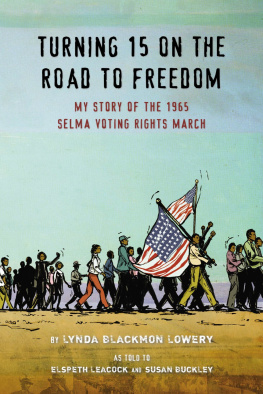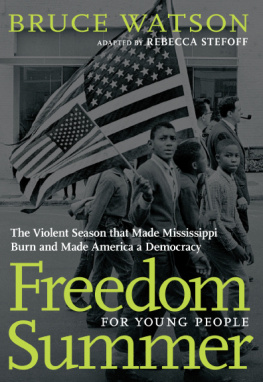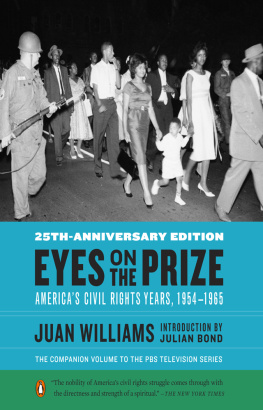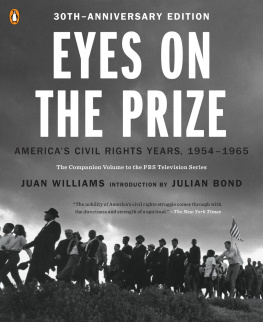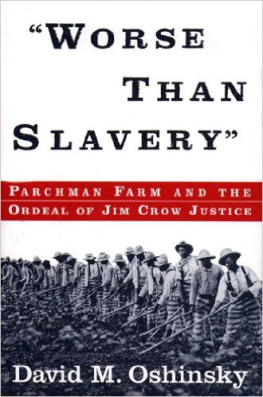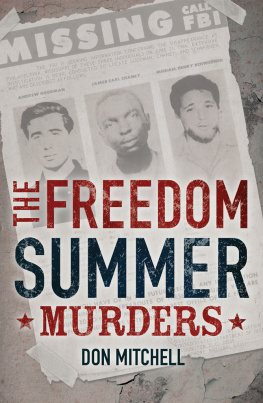Published by The History Press
Charleston, SC
www.historypress.com
Copyright 2018 by G. Mark LaFrancis, Robert Morgan and Darrell White
All rights reserved
All images are from the authors collection unless otherwise noted.
First published 2018
E-Book edition 2018
ISBN 978.1.43966.578.7
Library of Congress Control Number: 2018948038
Print edition ISBN 978.1.46714.064.5
Notice: The information in this book is true and complete to the best of our knowledge. It is offered without guarantee on the part of the authors or The History Press. The authors and The History Press disclaim all liability in connection with the use of this book.
All rights reserved. No part of this book may be reproduced or transmitted in any form whatsoever without prior written permission from the publisher except in the case of brief quotations embodied in critical articles and reviews.
To all those from Natchez, Mississippi, who suffered needlessly in October 1965 for standing up for their rights. May this book inspire a new generation to be just as brave.
And to the late Mississippi journalist Bill Minor, who went above and beyond the call of duty to report the truth about Mississippi and especially the civil rights era.
CONTENTS
FOREWORD
Finally!
This book finally exposes one of the least-known, untold travesties of the civil rights era. Most all of us have heard of Bloody Sunday in Selma, Alabama; the Freedom Riders courage; the assassinations of the Reverend Martin Luther King Jr. and Medgar Evers; the brutal slaying of young Emmett Till; the murders of the Neshoba County Three; and my own struggle with Ole Miss.
However, until now, discussion of the Parchman Ordeal has remained silent on the national scene. You will not read about it in history books nor see it on panels in museums or memorials. Yet the Parchman Ordeal is a scar on Mississippis history that remained unhealed for a half century. It is my hope that this book will help be a salve to the 150 or so young men and women who unnecessarily endured humiliation, punishment and abuse in October 1965 at the Mississippi State Penitentiary in Parchman, Mississippi. Their infraction: attempting to walk peacefully in the public streets of Natchez to show their support for equal rights and voting rights.
What? you may ask. No one ever was sent to the state penitentiary for exercising their constitutional rights. In the pages that unfold here, you will witness their arrest outside their Christian churches, the herding of them into the Natchez City Auditorium and the forced busing of them to the penitentiary. There, the ordeal unfolded for days as they were treated, as one of them said, as less than human.
James Meredith, international civil rights legend.
Also, you will read the extraordinary steps that unfolded before the Parchman Ordeal occurred: the attempted murder of a beloved Natchez NAACP leader; the ruthless attacks of a sinister arm of the Ku Klux Klan and the passionate and reasonable requests of Natchez African Americans of their city government; and the rejection of those appeals.
You will also read about the full breadth of the African American experience in Mississippi: slavery, Reconstruction, Jim Crow, Black Codes, the Sovereignty Commission and the terrible abuse of the Freedom Riders.
Remarkably, the Parchman Ordeal survivors opened their hearts and souls to the authors, exposing the raw and painful experience to which they were subjected as mere teens and young adults. Some of what you read will be uncomfortable, as it should. Yet this book shares their courage, inspiration and strength.
The authors need to be applauded for their passion in telling this story. They have spent hundreds of uncompensated hours on this book and a documentary, The Parchman Ordeal: The Untold Story, which has been received with acclaim at national film festivals and was declared the Most Transformative Film at the 2017 Crossroads Film Festival in Mississippi. The film also was aired on Mississippi Public Broadcasting.
So be prepared to be amazed, moved and inspired by this most incredible chapter in the civil rights movementfinally told.
Finally!
James Meredith
Ole Miss, 1962
PREFACE
Natchez: Oldest City on the Mississippi River
Just as the Mississippi River twists and turns, rumbles and surges, zigs and zags, so, too, has the history of its oldest settlement: Natchez. Set high above the river on the Natchez Bluffs, the city has been home to American Indians, the Spanish, French, British, Jews, Catholics, Baptists, Methodists, Presbyterians, Episcopalians, Pentecostals, slaves, free black people, merchants, millionaires, Confederates, Yankees, famous authors, actors, singers, politicians, lawyers, doctors, historians, cotton barons, oil tycoons and gunslingers, all the while perplexing and intriguing visitors from around the world coming and going by riverboats, wagons, cars, foot leather, bus and horseback.
Natchez celebrated its 300th birthday in 2016 with a year full of small and large events. One particular event, though, was very much bittersweet: the Weekend of Reconciliation for the Parchman Ordeal, which is the focus of this book.
Fifty-one years prior to that Weekend of Reconciliation, an event occurred in Natchez that brought hurt and sorrow to approximately 150 young men and women, mostly African American. In October 1965, those young men and women, some as young as fourteen, were taken by law enforcement authorities to the Mississippi State Penitentiary in Parchman, Mississippi, where they were abused, punished and humiliated for days. They did not commit a crime, did not injure anyone, did not disturb the peace. The who, what, when, where and even the why will unfold in the coming pages.
Map of Mississippi. Courtesy Mississippi Department of Transportation, authors graphic.
Map of downtown Natchez. Courtesy City of Natchez Planning Department, authors graphic.
These two maps will help give you a sense of place as you journey with the survivors of the Parchman Ordeal.
Thank you,
G. Mark LaFrancis
Robert A. Morgan
Darrell S. White
www.parchmanordeal.org
Facebook: The Parchman Ordeal
Note: As this book was being prepared for publication, the authors requested that the Natchez City Court offer the Natchez civil rights advocates, especially those who survived imprisonment at Parchman, the chance to have their arrests for parading without a permit in October 1965 expunged from city records. Several arrestees accepted the offer, with many more still to be contacted. Thus, the process has begun to right a terrible civil rights injustice.


